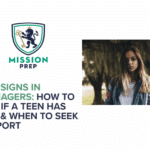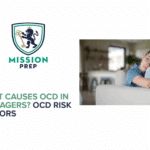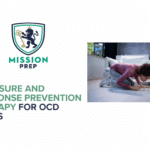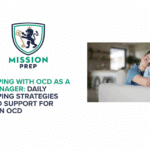OCD in Teens: Obsessive-Compulsive Disorder in Teens & Young Adults

Have you recently noticed something different about your teen? Perhaps they suddenly seem overly safety-conscious. Maybe they spend long periods in the bathroom, washing their hands. Or they double-check their bedroom door, homework, or backpack, over and over again. And when you ask them why, they brush it off. But something doesn’t feel right, and you’re starting to wonder whether there’s more to their actions.
Obsessive-compulsive disorder (OCD) is an often misunderstood condition in teens. It’s not about being neat and tidy – it’s a serious mental health challenge that can affect a teen’s confidence, relationships, and daily life.
Fortunately, OCD is a treatable condition, and your support can make a big difference in your child’s healing. Seeking guidance from a mental health professional can promote early intervention and recovery – before OCD symptoms worsen and impact all areas of life. This page can also help you better understand OCD in teens, as it covers:
- What OCD is
- Common signs and symptoms of OCD in teens
- How parents can support their teens
- Effective treatment options for teenage OCD
- Where to find professional support

What Is OCD in Teenagers?
Obsessive-compulsive disorder (OCD) is a condition that affects many people around the globe. People often notice the first symptoms of OCD during childhood or adolescence, and it’s estimated that around one in every hundred children and teenagers has it.1-3
Despite the high prevalence of teenage obsessive compulsive disorder, there’s still a lot of misunderstanding about what it is and what causes it. The following sections will explore these topics in more detail.
A Breakdown of OCD in Teens
The American Academy of Child & Adolescent Psychiatry (AACAP) defines OCD as having “recurrent intense obsessions and/or compulsions that cause severe distress and interfere with day-to-day functioning.”4
Obsessions are repetitive thoughts or images that prompt distress, extreme anxiety, or fear in a teen. These thoughts are unwanted, and often unrealistic or irrational. However, this doesn’t take away their power to strike fear or distress into the hearts of adolescents. To put it another way, obsessions can feel like playing a scratched record. It plays the same few seconds of a song over and over, and no matter how hard you try, you can’t move the needle.
Obsessions could revolve around a number of concerns, such as a fear of germs or worries that harm may come to themselves or others. Intrusive thoughts can also encompass many other themes, such as religion or morality.
Compulsions are the actions, behaviors, or “rituals” that a teen may perform in an attempt to cancel out the distress caused by obsessions. For instance, they may wash their hands for much longer than needed, or repeatedly check the locks on doors. However, compulsions only ever bring temporary relief from the anxiety.
While obsessions can have a wide array of themes, and compulsions can vary from the more visible (such as hand washing) to the hidden (mental rituals), one thing is constant. Teens do not get pleasure from carrying out compulsions. In other words, they don’t feel good about doing rituals, nor do they enjoy them. Instead, they are seeking temporary relief from the distress that not performing the compulsion can bring.
OCD and Anxiety in Teenagers
If you are wondering, Is OCD the same as anxiety?, it may help to clarify the main differences between the two.
Obsessions involved in OCD are repetitive, persistent, and unwanted. More importantly, they are usually unrealistic or irrational – they are not necessarily concerns about everyday issues or real-life problems. And, to relieve the distress caused by the obsessions, teens feel compelled to carry out certain behaviors, even if they realize that doing so is irrational.
Anxiety, on the other hand, often involves worries about a range of topics without the need to perform a set ritual to feel better. Both conditions can significantly impact a teen’s life and may worsen without treatment, so it’s wise to seek professional guidance if you have concerns about either.
Signs of OCD in Young Adults
Obsessive-compulsive disorder can feel like a never-ending cycle of fear. This is why it’s essential to recognize the OCD symptoms youth present – so that early support and treatment can be given to help teens manage this condition.
OCD can be very imaginative when it comes to obsessions and rituals. Although the specifics of obsessions and compulsions may be unique to a teen, some examples of obsession and compulsion themes can include:5
- Obsessions such as:
- Fear of contamination
- Fear of uncertainty
- Needing things to be in a certain order
- Thoughts of hurting either yourself or other people
- Other unwanted thoughts, such as those about sexual, religious, or aggressive themes.
- Compulsions such as:
- Cleaning or washing hands or surfaces
- Counting
- Checking
- Placing things in a certain order
- Seeking reassurance from others
- Repeating phrases, either out loud or silently in your head
The outward signs of OCD in teens may also be more subtle than those listed, as the teen may try to mask compulsions. Some examples of behaviors to watch for at school or home could include:6
- Avoiding touching surfaces that other people may have touched
- Refusing to play contact sports for fear of contamination
- Avoiding using public bathrooms
- Withdrawing from other people
- Not wanting to share things with others, such as clean crockery or silverware
- Turning light switches on and off
- Appearing very anxious
- Not wanting to eat in the school cafeteria
- Excessive praying to atone for perceived sins
If you recognize some of these behaviors in your teen, they may be displaying signs of obsessive-compulsive disorder. Consulting with a mental health professional is often one of the best ways to access the support your child needs. We shall explore treatment options for OCD, as well as how you can support your teen, later in this article.
Causes of OCD in Teens
The causes of OCD young adults can struggle with aren’t fully understood. However, research tells us that there may be certain risk factors associated with its development. These can include:7-9
The Impact of OCD
Coping with OCD as a teen can be a challenge. As it’s not something that can be easily compartmentalized, it may affect every area of their life.
For example, OCD symptoms can interfere with friendships, family dynamics, romantic relationships, and hobbies. This is because the time taken up by obsessions and compulsions, as well as the intense distress that comes with intrusive thoughts, can interfere with other life domains.
OCD in teens may also affect their academic work due to how time-consuming compulsions and obsessions can interrupt their focus. Additionally, a teen might become isolated if they withdraw from others due to fears about their OCD being discovered or being bullied for their compulsions. Unfortunately, this withdrawal can lead to difficulty in maintaining friendships, and cause worsening OCD symptoms.6
Further, teenagers with OCD may feel high levels of distress or anxiety caused by their obsessions, or even shame or embarrassment over the topic of their obsessions. Therefore, research shows that teens with OCD are at increased risk of developing anxiety disorders as adults.10
As you may be able to tell, OCD can be an extremely distressing condition for adolescents to live with. However, there are things parents can do to support their teen, which we shall focus on next.
How Parents Can Support Teens With OCD
Watching your child struggle with a mental health condition can leave you feeling helpless. You might not know how to help in ways that don’t increase distress or make symptoms worse. Fortunately, there are several ways you can support your child as they heal from OCD. Some suggestions for how you can help include:
- Learning about OCD: Knowledge is power, and learning about OCD can enable you to support your teen with understanding and compassion. There are many teen mental health OCD resources available on the internet, as well as documentaries that may help you understand OCD better. However, make sure you seek credible information.
- Knowing how to recognize the signs: Familiarizing yourself with the symptoms of OCD means you can ensure your teen gets the timely support, treatment, and help for teenage OCD that they deserve and need.
- Being a safe person to talk to: Listen to your teen with empathy when they talk to you about their concerns. For instance, show them that it’s OK to talk about worries and mental health challenges. Also, reassure them that the obsessions and compulsions they are experiencing are not their fault; it is a medical condition that can be treated.
- Not enabling their rituals: It might be difficult to do so, but try to avoid helping your teen with their compulsions. Explain to them that rituals are part of OCD, and that you cannot take part in them. You could even try to find a kind, compassionate way to help them resist their compulsions.
- Seeking professional help: OCD in teens can be a complex, anxiety-provoking condition. It often requires professional support for a successful and effective recovery. Encourage your teen to seek help from a mental health professional, such as a doctor or therapist.
OCD Treatment for Teens
The good news is that OCD can be very effectively treated, especially when it’s caught early. With the right support, teens struggling with OCD can regain control over their thoughts, reduce their distress, and develop healthy ways of coping with mental health struggles.
Below, we outline some of the most common treatment options available for OCD in teens.
CBT and ERP Therapies for OCD
The most effective therapy for OCD is a type of cognitive behavioral therapy (CBT) called exposure and response prevention (ERP).11 This type of therapy teaches teens to face their fears while safely resisting compulsions, thus allowing them to see that their fears likely will not come true.
The obsessive compulsive disorder therapy teens benefit from most is one that allows them to face their fears gradually. So, instead of facing their worst fears first, ERP promotes starting with exposures that provoke the least anxiety and working their way up to more anxiety-inducing ones. This way, teens learn to tolerate uncertainty, cope with anxiety, and gain control over how they respond to distress.
Medication for OCD in Teens
Medication may be an option for teens with moderate to severe symptoms, or when ERP therapy hasn’t been entirely successful. When this is the case, medications such as selective serotonin reuptake inhibitors (SSRIs) are often recommended. Additionally, a tricyclic antidepressant (TCA) called “clomipramine” can be effective for managing OCD; however, it often comes with a higher risk of side effects than SSRIs. This is why it is not recommended as the first medication to try for OCD symptom control.12
OCD Treatment Centers for Youth: Residential and Intensive Programs
For teenagers whose symptoms interfere with their daily functioning, a more intensive support option may be required. Often, this can be sought from mental health treatment centers that provide support for OCD in teens. These centers often offer higher levels of care and support, such as residential treatment or intensive outpatient care. They provide a structured routine in a safe environment with access to mental health experts trained to help adolescents recover from OCD.
OCD can be a debilitating mental health condition to live with – but it doesn’t have to be. Treatment can be extremely effective at managing symptoms and bringing relief to teens struggling with obsessions and compulsions. With the right support, healing is possible.

Heal From OCD With Mission Prep
Seeing your teen struggle with OCD can feel overwhelming, but they don’t have to face it alone – and neither do you.
At Mission Prep, we specialize in helping teens overcome mental health challenges such as OCD. Our compassionate team can support your child using evidence-based approaches like exposure and response prevention (ERP), which is considered the gold standard treatment for OCD.
Whether your teen is just beginning to show OCD symptoms or needs more intensive support, our team of experts is here to help them (and you) take the next step on their healing journey. Contact us today to learn more about how our teen-focused OCD treatment programs can support your teenager toward lasting recovery.
References
- Millet, B., Kochman, F., Gallarda, T., Krebs, M. O., Demonfaucon, F., Barrot, I., Hantouche, E. G. (2004). Phenomenological and comorbid features associated in obsessive–compulsive disorder: influence of age of onset. Journal of affective disorders, 79(1-3), 241-246.
- Geller, D. A., Homayoun, S., & Johnson, G. (2021). Developmental Considerations in Obsessive Compulsive Disorder: Comparing Pediatric and Adult-Onset Cases. Frontiers in psychiatry, 12, 678538. https://doi.org/10.3389/fpsyt.2021.678538
- Browne, H. A., Hansen, S. N., Buxbaum, J. D., Gair, S. L., Nissen, J. B., Nikolajsen, K. H., Schendel, D. E., Reichenberg, A., Parner, E. T., & Grice, D. E. (2015). Familial clustering of tic disorders and obsessive-compulsive disorder. JAMA psychiatry, 72(4), 359–366. https://doi.org/10.1001/jamapsychiatry.2014.2656
- AACAP. (n.d.). Obsessive Compulsive Disorder Resource Center. Retrieved September 8, 2025. https://www.aacap.org/aacap/Families_and_Youth/Resource_Centers/Obsessive_Compulsive_Disorder_Resource_Center/Home.aspx
- Mayo Clinic. (2023, December 21). Obsessive-compulsive disorder (OCD) – Symptoms and causes. https://www.mayoclinic.org/diseases-conditions/obsessive-compulsive-disorder/symptoms-causes/syc-20354432
- Anxiety and Depression Association of America, ADAA. (n.d.). OCD at school. Retrieved September 8, 2025. https://adaa.org/understanding-anxiety/obsessive-compulsive-disorder/ocd-at-school
- American Academy of Child and Adolescent Psychiatry. (2023, October). PANS and PANDAS: Sudden onset of OCD symptoms (No. 123) [Facts for Families informational sheet]. Facts for Families. https://www.aacap.org/AACAP/Families_and_Youth/Facts_for_Families/FFF-Guide/PANS_and_PANDAS-Sudden_Onset_of_OCD_Symptoms-123.aspx
- International OCD Foundation. (2025, April 22). What causes OCD? https://iocdf.org/about-ocd/what-causes-ocd/
- National Health Service (NHS). (2025, July 28). Overview – Obsessive compulsive disorder (OCD). NHS Website. https://www.nhs.uk/mental-health/conditions/obsessive-compulsive-disorder-ocd/overview/
- Lewin, A. B., Chang, S., McCracken, J., McQueen, M., & Piacentini, J. (2010). Comparison of clinical features among youth with tic disorders, obsessive–compulsive disorder (OCD), and both conditions. Psychiatry Research, 178(2), 317–322. https://doi.org/10.1016/j.psychres.2009.11.013
- IOCDF. (2024, May 20). OCD in Kids. https://kids.iocdf.org/professionals/mh/about-erp-for-pediatric-ocd/
- International OCD Foundation. (n.d.). Medication for pediatric OCD. In OCD in Kids. Retrieved September 9, 2025, from https://kids.iocdf.org/professionals/mh/meds-for-pediatric-ocd/



















